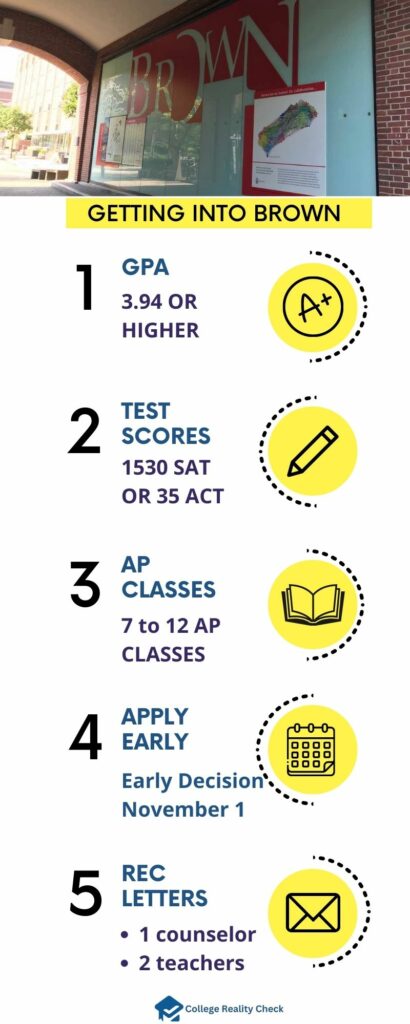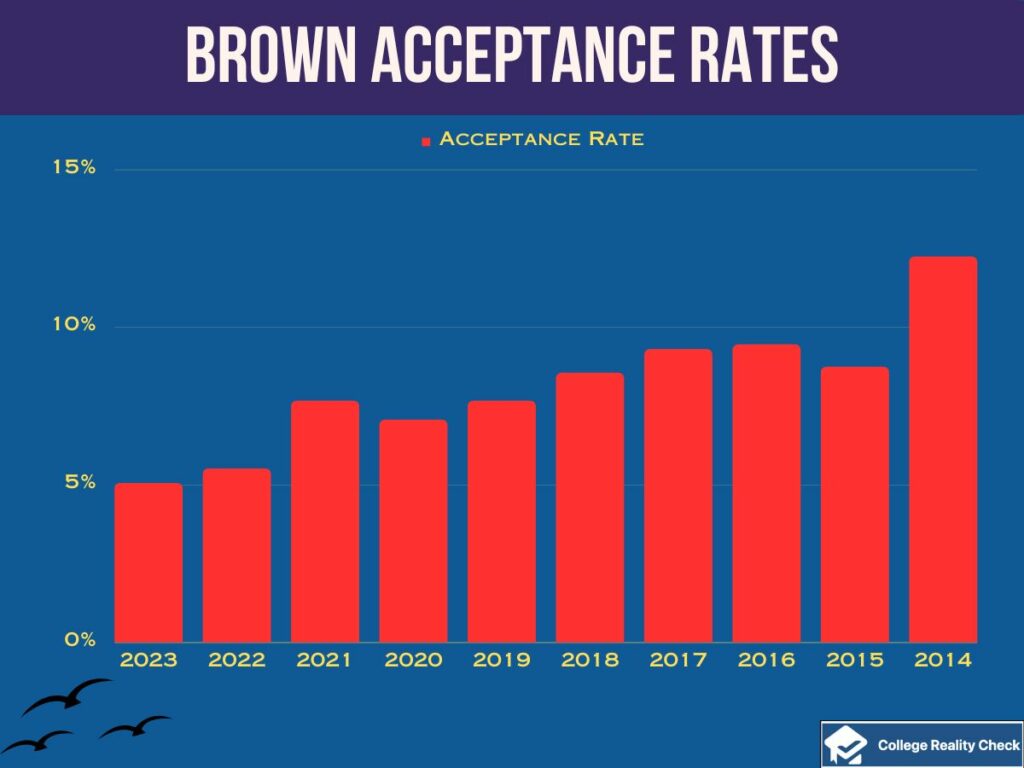Brown University Challenge: How Your High Schooler Can Stand Out Among 50,000 Applicants
When applying to a selective institution, you need all the college admissions tips you can get.
The Ivy League schools are some of the hardest to get into in the United States — academic year after academic year, fewer than 10% of applicants receive an offer to enroll.
Brown University is one of the most difficult to get into, given that it has an acceptance rate of 5%.
You have to be the cream of the crop of your graduating high school class.
You must stand out from the 50,000+ applicants.
You must win over Brown’s admissions officers with your Common App to get your hands on that acceptance letter that leaves 95% of all hopefuls crying and disappointed.
While every component of your college application matters, you should focus more on these:
- GPA
- Class rank
- AP Classes
- College preparatory courses
- SAT or ACT
- Essays and short-answer questions
- Recommendation letters
- Extracurriculars
- Early application

Aim for the Highest GPA You Possibly Can
Brown does not require applicants to meet a minimum GPA requirement.
Its Common Data Set (CDS) does not indicate the average high school GPA of admitted first-time, first-year students, thus leaving everyone clueless as to which GPA is good enough for admission.
That’s a problem because its CDS report says GPA is a critical admission factor.
Great news: anybody with any GPA may apply.
However, Brown says applicants with a high school GPA below 3.0 must submit additional evidence demonstrating their academic achievements and potential.

What GPA Can Help Increase My Chances of Getting In?
Since you are applying to a competitive school, it’s always safe to aim high.
Various websites recommend having a GPA between 3.9 and 4.0 to increase your chances of getting into an institution where 95% of first-year applicants get turned down.
Graduate Near or at the Top of Your Class
Like GPA, class rank is one of the most significant admission criteria.
Around 93% of first-time, first-year students Brown admits graduated in the top 10% of their high school class.
Indeed, being one of the highest-performing students in your class is a huge plus if you are looking to attend Brown or any other highly competitive postsecondary institution.
It’s a must to note, however, that Brown does not make admissions decisions based on a student’s rank alone.
While its admissions officers will look at your class rank, they will also consider other components of your application to understand better your academic preparation and potential to contribute to the Brown community.
Will My Brown Application Look Bad If My High School Does Not Rank Students?
It’s not your fault if your high school doesn’t have a ranking system, which is why Brown will not take it against you. So, in other words, it won’t disadvantage you in the admissions process.
Just make sure, however, that your overall application is compelling.

Show You’re Ready for College Through College-Level Courses
Brown wants to know if you challenged yourself in high school by taking advanced classes.
Without some AP classes in your college application or transcript, even though many are available at your high school, you may appear less college-ready than applicants who took them.
But don’t just take any AP classes — take difficult ones!
Taking difficult AP classes increases your college application’s value in the following ways:
- It shows you can handle college-level courses
- It increases the rigor level of your high school record
- It can boost your weighted GPA
Many college counselors agree that taking 7 to 12 AP classes throughout your high school career is ideal in boosting your chances of getting into an Ivy League.
Can I Earn College Credit for High AP Exam Scores?
Brown University does not give college credit to AP exam scores.
However, college-bound teens may still use some AP exam scores for placement to enroll in advanced courses and satisfy course requirements for their respective concentrations.
Take All Required College Prep Courses
Besides AP classes, take college preparatory courses Brown requires.
College prep courses are a part of the standard high school curriculum — they prepare you for rigorous college courses by enhancing your critical thinking, study, and academic skills.
Typically, they are core courses.
It means you must take them to meet your high school’s requirements for graduation. Whether or not you intend to apply to Brown, you must take college prep courses.
However, having enough units is vital to get into Brown.
The following table shows the units of core courses required and recommended:
| Course Name | Units Required | Units Recommended |
|---|---|---|
| English | 4 | 4 |
| Mathematics | 4 | 4 |
| Science | 3 | 4 |
| Foreign Language | 3 | 4 |
| History | 2 | 3 |
Please note that a unit is equivalent to a year of study.
Which Foreign Language Course Should I Take to Get Into Brown?
Personal interest is a consideration when deciding which foreign language to study in high school.
Your college application, however, will look better if you opt for a foreign language course that aligns with your intended concentration in college and career goal.
Submit Your Test Scores (Don’t If They’re Low)
Brown is a test-optional school.
Your application will still undergo evaluation even if it does not indicate your SAT or ACT scores.
Similarly, its admissions officers will factor in your test scores during the evaluation process if included, which means they can impact your admissions chances.
Just because you took the SAT or ACT doesn’t mean you should report your scores.
The composite SAT scores of admitted first-time, first-year students range between 1490 and 1580, while their composite ACT scores range between 34 and 36.
A score close to or better than the higher end of the range can boost your chances of getting in.
On the other hand, a score close to or worse than the lower end of the range can hurt your application — it’s a good idea not to include it and enhance other components of your application to make up for the absence.
Will I Need to Provide an Explanation for Not Submitting Test Scores?
Brown neither requires nor expects an explanation from applicants who choose not to include their SAT or ACT scores in their college application for whatever reason.
Its admissions officers will look at other application components in making a decision.
Write All Essays and Answer All Short-Answer Questions
Besides the Common App essay or personal statement, applicants must also submit the following:
- Three Brown-specific essays
- Four short-answer questions
The Common App essay is between 250 and 650 words.
Meanwhile, college-specific essays Brown requires are between 200 and 250 words.
There’s no list of various prompts to choose from — you should answer whatever prompt is available, and the following are the ones to respond to as of writing this:
- Tell us about any academic interests that excite you and how you might pursue them at Brown.
- Share how an aspect of your growing up has inspired or challenged you and what unique contributions this might allow you to make to the Brown community.
- Whether big or small, mundane or spectacular, tell us about something that brings you joy.
Short-answer questions, meanwhile, are between 3 and 100 words.
Is It Okay to Exaggerate on My College Essay to Get In?
Admissions officers at Brown and other learning institutions requiring application essays want to know applicants (the writers) more, and stretching the truth defeats that purpose.
Go for descriptive language and exemplary story-telling instead of lying to make your college essays impressive.

Picking the Right Recommenders is Recommended
First-time, first-year applicants to Brown are required to submit the following:
- One counselor recommendation letter
- Two teacher recommendation letters
Whoever your high school counselor is should write your counselor letter of recommendation.
On the other hand, you have a choice with your teacher recommendations — choosing those who can convincingly talk about your academic achievements and intellectual promise.
However, Brown says to obtain recommendation letters from teachers who have taught you in your major academic subjects such as English, mathematics, science, social studies, and foreign language.
And if you intend to earn a bachelor of science degree, one recommender should be a science or math teacher.
May I Submit an Additional Letter of Recommendation?
Usually, Brown’s admissions officers obtain enough details from one counselor recommendation and two teacher recommendations to make an informed and thoughtful admission decision.
However, you may also submit an additional letter from someone with something unique to share about you.
Go for Extraordinary Extracurriculars
Brown’s admissions officers consider various non-academic admissions criteria.
Your list of extracurriculars is one of those with the most weight.
There are 10 spaces for activities on the Common App — you can choose to fill every available slot or provide just five to six extracurricular activities, starting with the most meaningful.
In terms of EAs, the more doesn’t necessarily mean the merrier.
Competitive colleges and universities would much rather see a few meaningful and impactful after-school activities than several seemingly pointless and randomly selected ones.
If the goal is to get into an Ivy League school, highlight community engagement and volunteerism.
Demonstrating those that align with your intended major is also a wonderful idea. Often, it indicates you are interested in what you want to concentrate on and have the skills necessary to succeed in college and beyond.
Can I Apply to Brown Without Extracurriculars?
You can get into college with no extracurriculars listed on your application. While EAs can boost your application and establish a well-rounded education and personality, they are not the only criteria in admission decision-making.

Just ensure that the rest of your application’s components can compensate for the absence of extracurriculars.
Early Application Equals Better Admissions Chances
I accessed Brown University’s latest CDS.
I did the math.
I learned this: a whopping 15% is the early decision acceptance rate!
Given that, as mentioned earlier, Brown accepts only around 5% of applicants, your chances of getting in when you apply through ED is three times higher than via regular decision.
So, instead of submitting your application on January 3, submit it on November 1.
However, early application doesn’t imply an automatic advantage in the admission process.
Here’s why the acceptance rate for ED applicants is higher than that for RD applicants: the early application pool is packed with exceptional students, which is why many are accepted.
You must have a competitive application to enjoy better admissions chances as an early applicant.
Read Next: How to get into UPenn
Disclaimer: The views and opinions expressed in this article are those of the authors and do not necessarily represent those of the College Reality Check.






